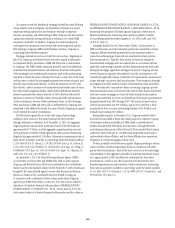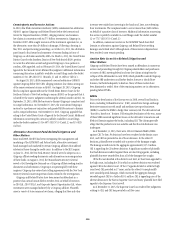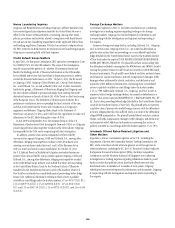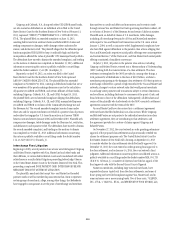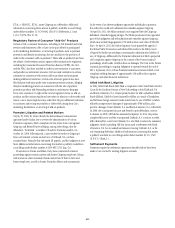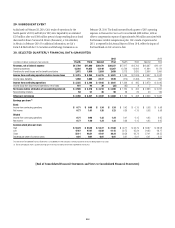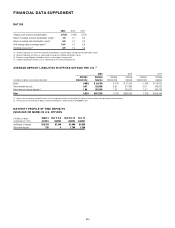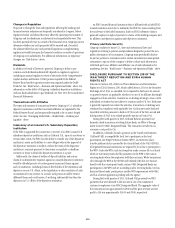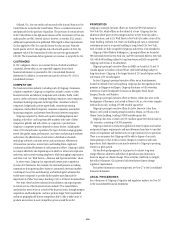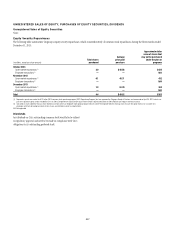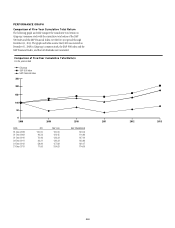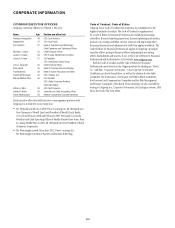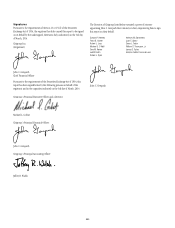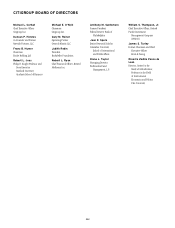Citibank 2013 Annual Report Download - page 333
Download and view the complete annual report
Please find page 333 of the 2013 Citibank annual report below. You can navigate through the pages in the report by either clicking on the pages listed below, or by using the keyword search tool below to find specific information within the annual report.315
Changes in Regulation
Proposals to change the laws and regulations affecting the banking and
financial services industries are frequently introduced in Congress, before
regulatory bodies and abroad that may affect the operating environment of
Citigroup and its subsidiaries in substantial and unpredictable ways. This
has been particularly true as a result of the financial crisis. Citigroup cannot
determine whether any such proposals will be enacted and, if enacted,
the ultimate effect that any such potential legislation or implementing
regulations would have upon the financial condition or results of operations
of Citigroup or its subsidiaries. For additional information on regulatory
changes, see “Risk Factors” above.
Dividends
In addition to Board of Directors’ approval, Citigroup’s ability to pay
common stock dividends substantially depends on regulatory approval,
including an annual regulatory review of the results of the Comprehensive
Capital Analysis and Review (CCAR) process required by the Federal
Reserve Board and the supervisory stress tests required under the Dodd-
Frank Act. See “Risk Factors—Business and Operational Risks” above. For
information on the ability of Citigroup’s subsidiary depository institutions
and non-bank subsidiaries to pay dividends, see Note 19 to the Consolidated
Financial Statements.
Transactions with Affiliates
The types and amounts of transactions between Citigroup’s U.S. subsidiary
depository institutions and their non-bank affiliates are regulated by the
Federal Reserve Board, and are generally required to be on arm’s-length
terms. See also “Managing Global Risk—Market Risk—Funding and
Liquidity” above.
Insolvency of an Insured U.S. Subsidiary Depository
Institution
If the FDIC is appointed the conservator or receiver of an FDIC-insured U.S.
subsidiary depository institution such as Citibank, N.A., upon its insolvency or
certain other events, the FDIC has the ability to transfer any of the depository
institution’s assets and liabilities to a new obligor without the approval of
the depository institution’s creditors, enforce the terms of the depository
institution’s contracts pursuant to their terms or repudiate or disaffirm
contracts or leases to which the depository institution is a party.
Additionally, the claims of holders of deposit liabilities and certain
claims for administrative expenses against an insured depository institution
would be afforded priority over other general unsecured claims against
such an institution, including claims of debt holders of the institution and
depositors in non-U.S. offices, in the liquidation or other resolution of such
an institution by any receiver. As a result, such persons would be treated
differently from and could receive, if anything, substantially less than the
depositors in U.S. offices of the depository institution.
An FDIC-insured financial institution that is affiliated with a failed FDIC-
insured institution may have to indemnify the FDIC for losses resulting from
the insolvency of the failed institution. Such an FDIC indemnity claim is
generally superior in right of payment to claims of the holding company and
its affiliates and depositors against such depository institution.
Privacy and Data Security
Citigroup is subject to many U.S., state and international laws and
regulations relating to policies and procedures designed to protect the non-
public information of its consumers. Citigroup must periodically disclose
its privacy policies to consumers and in certain circumstances must permit
consumers to opt out of the company’s ability to share such information
with third-party non-affiliates and affiliates’ use of such information for
marketing. See also “Risk Factors—Business and Operational Risks” above.
DISCLOSURE PURSUANT TO SECTION 219 OF THE
IRAN THREAT REDUCTION AND SYRIA HUMAN
RIGHTS ACT
Pursuant to Section 219 of the Iran Threat Reduction and Syria Human
Rights Act of 2012 (Section 219), which added Section 13(r) to the Securities
Exchange Act of 1934, as amended, Citi is required to disclose in its annual
or quarterly reports, as applicable, whether it or any of its affiliates knowingly
engaged in certain activities, transactions or dealings relating to Iran or with
individuals or entities that are subject to sanctions under U.S. law. Disclosure
is generally required even where the activities, transactions or dealings were
conducted in compliance with applicable law. Citi has previously disclosed
reportable activities pursuant to Section 219 for each of the first, second and
third quarters of 2013 in its related quarterly reports on Form 10-Q.
During the fourth quarter of 2013, Citibank Bahrain processed one
domestic check transaction involving Future Bank, an Office of Foreign
Assets Control (OFAC) Designated Bank. This transaction resulted in no
revenues or net profit to Citi.
In addition, Citibank’s branch operation in the United Arab Emirates
(Citibank UAE) is compelled by local law to participate in the local
government-run Wage Protection System (WPS), an electronic salary-
transfer platform that is operated by the Central Bank of the UAE (CBUAE).
All registered financial institutions are required by local law to participate in
the WPS. Under the WPS, each local employer sends a secure file to its bank
which in turn must process the file payments via the WPS to the various
receiving banks where the employees hold their accounts. While transactions
clear through the WPS at the CBUAE and Citibank UAE does not transact
directly with the counterparty banks, certain OFAC Designated Banks are
participants in the WPS and act as sending and/or receiving banks. Citi has
discussed those banks’ participation and the WPS requirements with OFAC,
and has a license application pending with the agency.
During the fourth quarter of 2013, Citibank UAE processed two WPS
payments that were destined to the account of one of its commercial
customer’s employees at an OFAC Designated Bank. The aggregate value of
the transactions was approximately $2,900 and the gross revenue and net
profit to Citi was approximately $14.00 and $9.00, respectively.


